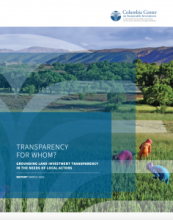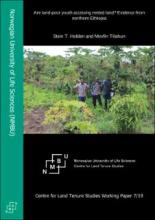Land Library
Welcome to the Land Portal Library. Explore our vast collection of open-access resources (over 74,000) including reports, journal articles, research papers, peer-reviewed publications, legal documents, videos and much more.
/ library resources
Showing items 1 through 9 of 34.New research by CCSI and the Centre pour l’Environnement et le Développement (CED) on transparency of land-based investment in Cameroon.
In the report, CCSI and CED find that:
Transparency is often seen as a means of improving governance and accountability of investment, but its potential to do so is hindered by vague definitions and failures to focus on the needs of key local actors.
This report presents two papers developed in order to study behaviour in trust games in 18 Malawian villages in 2007.
This note proves recommendations for governments, international actors, and mining advocates who seek to optimize the value of green energy mineral reserves, to ensure that expectations for green energy materials do not replace careful planning, impact assessment, and allocation of risks, as well
We assess the extent of access and degree of participation by smallholder tenants in the land rental market in Malawi. Our study is based on three rounds of nationally representative Living Standards Measurement Surveys collected in 2010, 2013 and 2016, from which we construct a balanced panel.
Continued strong population growth in already densely populated rural areas in parts of Sub-Saharan Africa makes it harder for youth to choose agriculture as their main source of income. We investigate whether near landless youth still can access rented land as a complementary source of income.
We study how social preferences and norms of reciprocity are related to generalized and particularized trust among members of youth business groups in northern Ethiopia. Members of these groups are recruited among land-poor rural youth.
This primer provides an introduction to some of the key issues that arise in the negotiation of contracts linked to investments in agriculture, and practical guidance for how to approach common issues.
This note provides guidance for civil society actors and communities on how to access and how to use the information contained in contracts with companies to be able to:
• Understand company and government obligations related to a company project;








